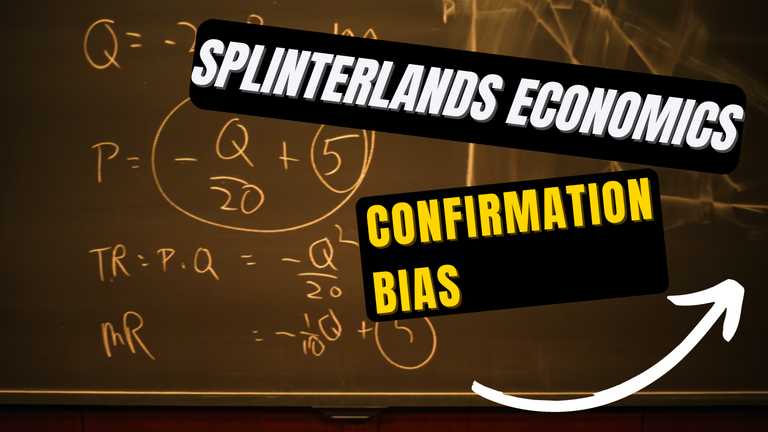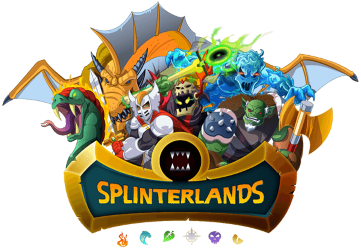Splinterlands Economics: Confirmation Bias
Hello everyone! We are back again today with another edition of Splinterland Economics - a series in which we introduce a basic economic concept and then apply it to Splinterlands. If this is your first time reading, just to tell you a little bit about myself: my day job is in an unrelated area but I consider myself a little bit of economics nerd - I read a little (or maybe way, way) more news than I should, double majored in econ, and am obsessed with optimization. I love the way Splinterlands is equal parts card game and resource allocation game. My goal with these articles is to share a little bit of what I know with you all.
Have you ever had days where it seems like every other car on the road is passing you regardless of which lane you are in? Or maybe a Splinterlands gameplay session where your monsters seem to miss every time and their abilities never trigger? You may have been subject to the topic of this week's post! Our subject today dives back in to behavioral economics and a bit of psychology, and has to do with how we know the things that we know - or at least, how we think we know the things that we know. Today, we'll be talking about Confirmation Bias!

What is Confirmation Bias?
Confirmation Bias refers to the fact that many of us will tend to focus on things or events which are in line with our prior beliefs - in other words, things which confirm those prior ideas. For example, if you think that you have bad luck for any variety of reasons (perhaps a broken mirror, bad karma, or a "rigged" random number generator), then you may be able to easily pick out any unfortunate events which occur as examples of your bad luck. Or if you have a theory that a particular asset is bound to skyrocket in value in the future, then you may be quick to view any minor upward movements in price as the beginning of a large upswing.
As you may be able to tell from the previous examples, the impacts of confirmation bias can range from the relatively inconsequential - such as funny superstitions or a bit of extra frustration, to disastrous - such as significant financial loss. But each case has a similar cause - our brains have a tendency to pick out things which reinforce our prior beliefs, and when we see all of those things then it becomes very easy to be more certain of things than may be justified if we were to look at things impartially. If you have heard concerns in the past few years about social media "algorithms" or "fake news", both of these are examples of things which can easily amplify an individual's confirmation bias by showing them articles or dialog which they agree with regardless of whether it is accurate or not.
So the big question is, "how can I avoid confirmation bias"? And unfortunately, you can't - we (or at least most of us) are human, and our monkey brains tend to behave in certain ways, quirks and all. But while it can't be avoided entirely, it IS possible to take steps to reduce confirmation bias and recognize it as often as we can. Thinking about decisions as logically as possible (as opposed to emotionally) helps. So does looking at a situation through the numbers or statistics. I should note that WHICH numbers you look at are just as important, though that is a topic for another day. In general, if you are able to evaluate the entire situation relevant to a decision, as opposed to just a fraction of it, then you have a much better chance of reducing your confirmation bias. Of course, this is much easier said than done.
How do we apply it to Splinterlands?
Playing out your games in Splinterlands requires careful planning and execution, and many times there is a bit of randomness in battles - who you are matched up against, which cards they will choose to play, and whether attacks miss or abilities trigger once the actual battle begins. It is entirely too easy to go into a game with the belief that RNG is not on your side, see a coinflip or two go against you, and then have confirmation bias kick in. It may not matter how many times RNG goes your way - it can become incredibly easy to cherry pick all of the times it doesn't, and soon you may be on "tilt" - upset, possibly submitting sub-par teams, and ready to flip the proverbial table. This has happened to more more times that I would like to admit, and while everyone will have different process which are best for themselves, what I have found works well for me personally is to take a quick break, remind myself that RNG is RNG, and to just do my best to make the plays with the greatest chances of victory.
Outside of the actual battles, Splinterlands is also a game of asset allocation. Playing it well requires evaluation of different game-related items and currencies in order to determine how to spend or move our resources. Reading random opinions on Discord or Hive blog is a great way to hear a variety of opinions on where the markets are headed. It is also a great way to cherry pick the opinions that happen to agree with yours and become convinced that your personal investment thesis is a sure thing. I would like to emphasize here that I am not trying to say that it is a bad thing to read opinions or chat - research and communication are important and necessary in order to make informed decisions. But it is important to take a step back once in a while and make sure that you are not only looking at the opinions which happen to agree with your prior beliefs.
Why should we care?
Confirmation bias affects nearly everyone, and can change the way we view events and situations dramatically. The next time you are making a big decision in your personal life, investments, or business, take a second to step back and try to take a look at the whole picture - are you making your decision as objectively as possible, or with a biased view? Answering that question accurately could result in dramatic improvements in your relationships or pocketbook.
You have have heard the saying, "It ain’t what you don’t know that gets you into trouble. It’s what you know for sure that just ain’t so". Confirmation bias makes it much more likely that you'll think you know for sure things that "just ain't so". Ironically, despite being frequently attributed to Mark Twain (including by the film "The Big Short"), if you look into it you may be surprised to find that nobody knows for sure whether that quote actually came from him - a prime example of confirmation bias at work!
Thank you so much for reading all the way to the end. Interested in seeing some more of my writing in the future? Be sure to give me a follow! In the meantime, if you'd like to see some of my recent posts:
Tank You Very Much - Using Legionnaire Alvar in Battle! - Last week's battle challenge, featuring Legionnaire Alvar!
Splinterlands Economics: Diversification - An overview of the concept of diversification, and how we can apply it to Splinterlands!
Splinterlands Economics: Exchange Rates - An overview of the concept of exchange rates, and how we can apply it to Splinterlands!
Thinking about giving Splinterlands a try but haven't signed up yet? Feel free to use my referral link: https://splinterlands.com?ref=bteim, and be sure to reach out to me if you have any questions!
All images used in this article are open source and obtained from Pixabay or Unsplash. Thumbnails borrowed with permission from the Splinterlands team or made in Canva.




https://twitter.com/1467643672636190720/status/1618030207864307712
The rewards earned on this comment will go directly to the people( @bteim ) sharing the post on Twitter as long as they are registered with @poshtoken. Sign up at https://hiveposh.com.
Thanks for sharing! - Underlock#8573
